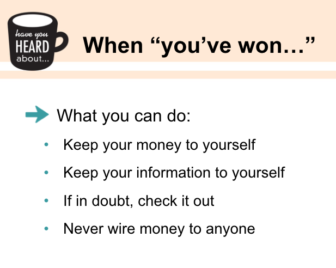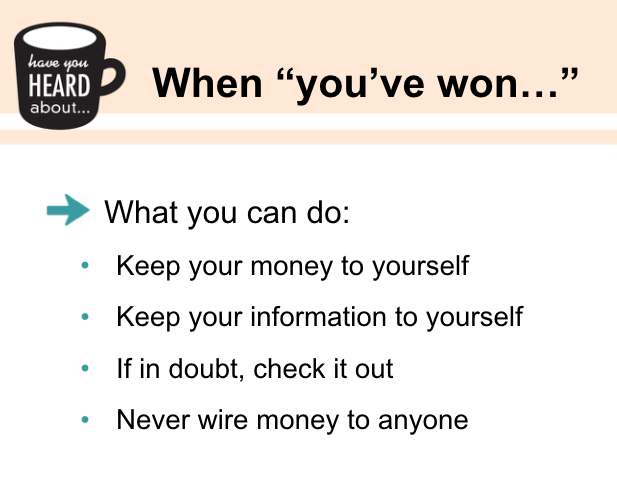You get a card, call, or email telling you that you won! Maybe it’s a lottery, sweepstakes, or some other prize. The person calling is excited and can’t wait for you to get your winnings.

Image from the FTC website
Advice from the Federal Trade Commission
But here’s what happens next: they tell you there’s a fee, some taxes, or customs duties to pay. They ask for your bank account information, or ask you to send money via a wire transfer or to purchase gift cards and provide the card numbers.
— This article is from the Federal Trade Commission Consumer Information blog.
Any way you send it, you lose money instead of winning it. You don’t get a big prize. Instead, you get more requests for money, and more promises that you won big. Scammers can be very convincing, and who wouldn’t want to win big!
Lottery and sweepstakes scams are one of the most common consumer frauds operating today. According to the FTC, these scams were the third-most common type of fraud reported to the agency in 2017.
Earlier this year, the FTC took action against an operation we alleged targeted older people with phony sweepstakes offers. The company sent mailers that made people think they had won $1 million (or more!), and that the recipient only needed to pay a small fee to claim it.
Help us help you and others by using the FTC’s top tips to avoid lottery and sweepstakes scams:
1. Keep your money – and your information – to yourself. Never share your financial information with someone who contacts you and claims to need it. And never wire money to or share gift card numbers with anyone who asks you to. Both payment methods are a sure sign of a scam.
2. Pass this information on to a friend. You probably throw away these kinds of bogus offers or hang up when you get these calls. But you probably know someone who could use a friendly reminder.
3. If you spot a scam, report it to the FTC at ftc.gov/complaint. Your report can help FTC investigators identify the scammers and stop them before they steal someone’s hard-earned money.
__________
Editor’s note: Colleen Tressler, the author, is a consumer education specialist at the FTC.


Pingback: Police: Beware the 'Publishers Clearing House' Scam — They're Taking, Not Giving Money - DarieniteDarienite